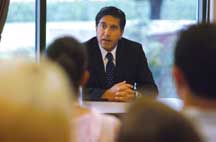Five questions with Sanjay Gupta
The CNN medical correspondent, practicing neurosurgeon and assistant professor of neurosurgery at the Emory University School of Medicine was the featured speaker at the Fogelson Honors Forum.
Five questions with Sanjay Gupta
The CNN medical correspondent, practicing neurosurgeon and assistant professor of neurosurgery at the Emory University School of Medicine was the featured speaker at the Fogelson Honors Forum.
 Popular TV personality Dr. Sanjay Gupta, CNN medical correspondent, practicing neurosurgeon and assistant professor of neurosurgery at the Emory University School of Medicine, was the featured speaker at the Fogelson Honors Forum in October. Prior to the forum, Gupta discussed a variety of topics during a question-and-answer session with students.
Popular TV personality Dr. Sanjay Gupta, CNN medical correspondent, practicing neurosurgeon and assistant professor of neurosurgery at the Emory University School of Medicine, was the featured speaker at the Fogelson Honors Forum in October. Prior to the forum, Gupta discussed a variety of topics during a question-and-answer session with students.
What do you think of our healthcare system compared to the rest of the world? We are running a healthcare system that is predicated on waste. Ninety percent of our healthcare budget for individuals is spent in the last two years of our lives. Is that the right thing to do or the wrong thing to do? I don’t know. But it’s something we in the United States do that is very different from the rest of the world.
What is your opinion of Red Cross workers being targeted by Iraqi insurgents? For a long time having the International Red Cross symbol on your vehicle or your clothing was a symbol of protection. … The first time I saw that systematically not being honored was in Iraq, where vehicles were targeted and ambulance drivers and ambulance passengers were being targeted and killed. And it was shocking. Why is this happening? As a journalist, as purveyors of news, you’ve got to dig a little deeper to find out what happened. Not that there’s an excuse.
What is the most satisfying story you’ve done? There have been a lot of stories that have been very satisfying. I think most recently Hurricane Katrina was one of the most satisfying experiences as a journalist. It was a terrible experience as a human being. There was a lot of misinformation going on from politicians of Louisiana saying [the hospitals] had been evacuated, [the patients] had all gotten out, which simply was not the case. … For me, it was a melding of my worlds, medicine and media, and ultimately it led to lives being saved.
How does advertising affect your work? I do segments and the camera goes black in and out of my segments. And they do that on purpose because there’s no sense in knowing who’s advertising around my segments. There’s that certain distance between journalism and the sales staff and all the advertising. One time I slammed Vioxx and right after that there’s an ad for Vioxx. I didn’t know that was going to happen, but it happened. And I got a thousand angry calls.
Are there times when being a doctor has affected your objectivity as a journalist? When I was an embedded journalist in Iraq with the Devil Docs, they had a general surgeon but they had no neurosurgeon, and they asked me if I could do an operation. I would say that was crossing the line. But how could you not save a life if you have the opportunity to do so?

Your comments are welcome
Comments
Related Reading:
Campus News: Alma Matters
TCU’s Library Celebrates a Century
Uncover hidden gems of the academic hub, from vintage mechanics to modern masterpieces.
Campus News: Alma Matters
Infographic: TCU’s Shared Values
The Board of Trustees adopted four TCU values after considering input from more than 4,000 constituents.